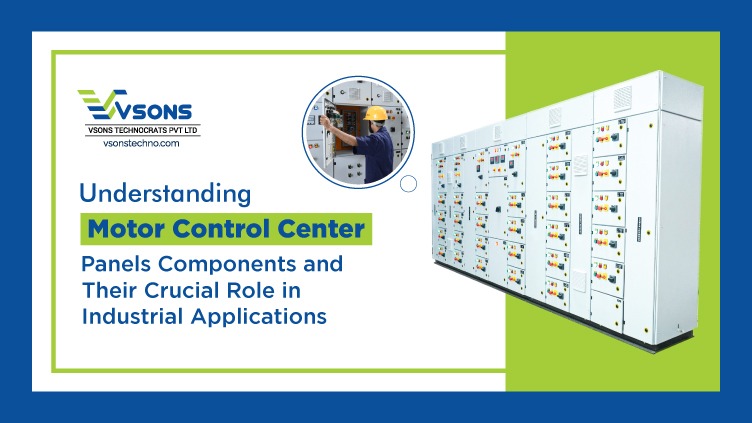Understanding Motor Control Center Panels Components and Their Crucial Role in Industrial Applications
- Posted On: November 21, 2023 Posted By: vsons
In the realm of industrial automation and machinery, the efficient management and control of motors play a pivotal role in ensuring seamless operations. This is where Motor Control Center (MCC) panels come into play. These sophisticated assemblies are fundamental in the organization and regulation of motors, offering a centralized platform for controlling various motors within an industrial setup. Understanding the components, design, and significance of MCC panels is essential in comprehending their role in industrial applications.
Components of MCC Panels
MCC panels are meticulously designed and constructed assemblies comprising several essential components, each serving a specific purpose in the motor control system. Some key elements include:
1.Motor Starters
These are the primary devices responsible for starting and stopping the motors. They include contactors, overloads, and other necessary protective devices.
2.Circuit Breakers
To protect the motors and equipment from electrical faults and overloads, circuit breakers are integrated into the MCC panel design. They interrupt the circuit during faults, preventing damage.
3.Control Circuitry
MCC panels contain control circuitry including relays, timers, and sensors that manage the operations and interactions between different motors and their associated equipment.
4.Variable Frequency Drives (VFDs)
In scenarios where variable speed control is required,VFD are utilized within MCC panels to regulate motor speed efficiently.
5.Power Monitoring Devices
These devices measure and monitor power consumption, aiding in the analysis of energy usage and optimizing efficiency.
6.Busbars and Interconnections
Conductive bars or busbars act as distribution channels, providing power to various components within the MCC panel. These facilitate efficient power distribution and reduce wiring complexity.
MCC Panel Design
MCC panel design is a meticulous process that involves considering various factors to ensure optimal performance and safety within an industrial environment. Several aspects contribute to a well-designed MCC panel
1.Space Optimization
Efficient utilization of space within the MCC panel is crucial. Proper layout and arrangement of components minimize footprint while ensuring accessibility for maintenance and troubleshooting.
2.Safety Measures
Incorporation of safety features is paramount. This includes proper insulation, grounding, and the use of protective devices to prevent electrical hazards.
3.Scalability and Flexibility
Designing MCC panels with scalability in mind allows for future expansion or modifications without extensive overhauls. Flexibility in design enables accommodating additional components or adjusting configurations as needed.
4.Cooling and Ventilation
To prevent overheating and ensure optimum performance of components, adequate ventilation and cooling systems are integrated into the design.
5.Compliance with Standards
Adherence to industry standards and regulations is imperative for MCC panel design. Compliance ensures safety, reliability, and compatibility with existing systems.
Importance in Industrial Applications
The significance of MCC panels in industrial settings cannot be overstated. They serve as the nerve center for motor control systems, offering several benefits:
1.Centralized Control
MCC panels provide a centralized platform for monitoring and controlling multiple motors and associated equipment, streamlining operations and reducing manual intervention.
2.Enhanced Safety
Incorporation of protective devices and safety measures within MCC panels minimizes the risk of electrical hazards, ensuring a safer working environment for personnel and equipment.
3.Increased Efficiency
Efficient control and management of motors lead to optimized operations, reduced downtime, and improved productivity within industrial facilities.
4.Diagnostic Capabilities
Advanced MCC panels often come equipped with diagnostic features, enabling real-time monitoring and analysis of motor performance, facilitating predictive maintenance and reducing unexpected breakdowns.
5.Cost Savings
Through energy monitoring and optimization, MCC panels aid in reducing energy consumption, resulting in cost savings for industrial operations.
6.Simplified Maintenance
Well-designed MCC panels offer ease of access for maintenance and troubleshooting, minimizing downtime and associated costs.
Evolution of Motor Control Systems
Over the years, motor control systems, especially those integrated within MCC panels, have undergone significant advancements. The advent of automation, IoT (Internet of Things), and data analytics has revolutionized motor control and monitoring:
1.Automation and Integration
MCC panels now integrate with automation systems, allowing for seamless communication between different components and enabling efficient coordination of operations.
2.Remote Monitoring and Control
With IoT integration, remote monitoring and control of motors through MCC panels have become feasible, allowing for real-time data collection and analysis from anywhere in the world.
3.Predictive Maintenance
Utilizing data analytics, MCC panels can predict potential faults or failures in motors, enabling proactive maintenance to prevent unexpected breakdowns.
4.Energy Optimization
Advanced MCC panels leverage sophisticated algorithms and data analytics to optimize energy usage, contributing to sustainability efforts and cost reduction
Motor Controller Center Panels (MCC) are indispensable assets in industrial setups, serving as control hubs for efficient management and regulation of motors and associated equipment. With their intricate design encompassing various components, MCC panels ensure streamlined operations, enhanced safety, increased efficiency, and cost savings.
Moreover, the evolution of motor control systems, incorporating automation, remote monitoring, predictive maintenance, and energy optimization, underscores their growing importance in modern industrial applications. Understanding MCC panels and their components is pivotal for businesses aiming to optimize their industrial processes while ensuring safety and reliability in their operations.

